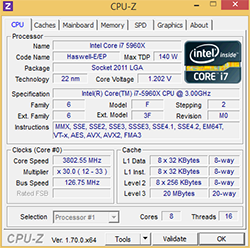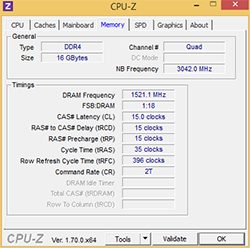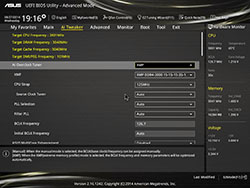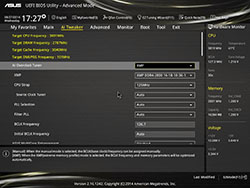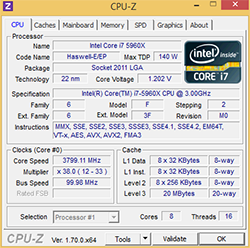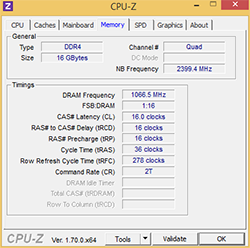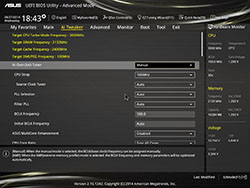Testing Methodology
Comparison Memory |
|||
|---|---|---|---|
| G.Skill Ripjaws 4 3,000 | Corsair Vengeance LPX 2,800 |
Corsair Vengeance LPX 2,800
|
|
| Model | F4-3000C15Q-16GRR | CMK16GX4MA2800C16 |
CMK16GX4MA2800C16 |
| Capacity | 16GB (4x4GB) | 16GB (4x4GB) |
16GB (4x4GB) |
| Speed | 3,000MHz | 2,800MHz |
2,133MHz |
| Timings | 15-15-15-35-2T | 16-18-18-36-2T |
16-18-18-36-2T |
| Voltage | 1.35V | 1.20V |
1.20V |
| Price* | £230 | £250 |
NA |
| Cost per GB* | £14.37 | £15.62 |
NA |
| *Approximate, correct at time of writing | |||
Test Platform |
|||
| CPU | Intel Core i7-5960X | ||
| Motherboard | Asus X99-Deluxe (5501 BIOS) | ||
| Storage Device | Crucial MX100 512GB SSD | ||
| Graphics Card | EVGA GeForce GTX 780 Ti (340.52 drivers) | ||
| Power Supply | Corsair AX760i | ||
| Operating System | Windows 8.1 64-bit | ||
Benchmarks |
|||
| HEXUS.PiFast | Our number-crunching benchmark stresses a single core by calculating Pi to 10m places | ||
| CINEBENCH R15 | Using Cinebench's multi-CPU render, this cross-platform benchmark stresses all cores | ||
| HandBrake 0.9.9.1 | Free-to-use video encoder that stresses all CPU cores (64-bit) | ||
| AIDA64 v4.60.3124 | Memory analysis tool supporting Haswell CPUs | ||
| 3DMark | DX11, Fire Strike default test | ||
| BioShock Infinite | DX11, 1,920x1,080, ultra quality | ||
| Batman: Arkham Origins | DX11, 1,920x1,080, enhanced quality | ||
| Total War: Rome II | DX11, 1,920x1,080, ultra quality | ||
Notes
Looking back at the Corsair Vengeance LPX 2,800MHz DDR4 review, inputting the required speeds isn't as simple as on the Z97/Haswell platform.
On the Asus X99-Deluxe motherboard the only method of achieving the correct timings and speeds is to use built-in XMP settings, as opposed to putting in a 100MHz base clock. Going via XMP requires a CPU strap and base clock of 125MHz, pushing the CPU speed out of the default specification.
We want to lock the CPU speed to a a certain frequency and then see what effect memory timings and frequency have on our benchmarks, rather than what effect the CPU imposes. The way to do this is to select a CPU speed - 3.8GHz in our case - and toggle the other parameters to fit.
3,000MHz DDR4 - G.Skill
We need to increase the DRAM frequency a touch to fit into an all-core 3.8GHz CPU speed, with the G.Skill running at 3,042.2MHz.
2,800MHz DDR4 - Corsair
2,133MHz DDR4 - Corsair
Overclocking
We've chosen three arbitrary speeds and timings in order to evaluate the overclocking potential of the G.Skill modules. Voltage was kept at 1.35V.
3,100MHz (15-15-15-36-2T) |
3,1000MHz (16-16-16-36-2T) |
3,200MHz (16-16-16-36-2T) |
|
|---|---|---|---|
| G.Skill Ripjaws 4 @ 1.35V |
|||
G.Skill is cutting it quite close in terms of headroom, though newer motherboard BIOSes may well improve memory overclocking potential.






